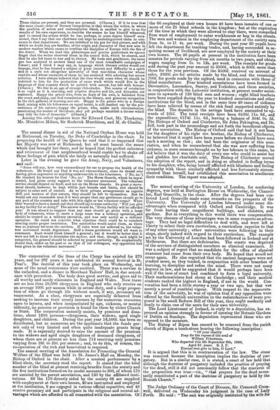The annual dinner in aid of the National Orphan Home
was held at Richmond, on Tuesday, the Duke of Cambridge in the chair. In proposing the health of the Queen he said that it so happened that her Majesty was now at Richmond, but all must lament the cause which had brought her there, and he hoped that the perfect calmness and retirement of that neighbourhood would enable her to shake off those feelings of pain which she lately so naturally had suffered. Later in the evening he gave the Army, Navy, and Volunteers, and said :
" Some will say, how very extraordinary for me to propose the health of the volunteers. He would say that it was not extraordinary, since lie denied ever having given expression to anything unfavourable to the volunteers. (' No, no.') He thanked his hearers for that No, no.' The Horse Guards, whom he repre- sented, had given every support to the volunteer movement. The volunteer service should depend on itself, and not on the Horse Guards. So great a move- ment should, however, be kept within just bounds and limits, and should be subject to some sort of control. As to their private arrangements as regards drill and matters of that nature, they should be left to themselves. But he would ask any reasonable man if it were proper that any gentleman should go to any part of the country and take with him eight or ten volunteer corps? When
they wanted to have a march out they should say to some.authority, ill you give us any facility for so doing?' The answer would be, 'Every facility will be afforded you. It was absurd to suppose that any man should go about with a large body of volunteers, when to move a large mass was a military operationrsind should be treated as a military operation, and was only useful as a military operation. He could not conceive what objection there could be to numbers meeting under proper restriction. The authorities would assist them, as there was no jealousy between the services. If rules were not adhered to, the volun- teer movement would degenerate. Half a dozen gentlemen would all want to command. Each would think himself a general; but it would be better that it were not left to them to determine the matter, and that, though each might be competent, the general should be selected by proper authority. He emphatically denied that, either on his part or on that of his colleagues, any opposition had been given to the volunteer movement."






























 Previous page
Previous page